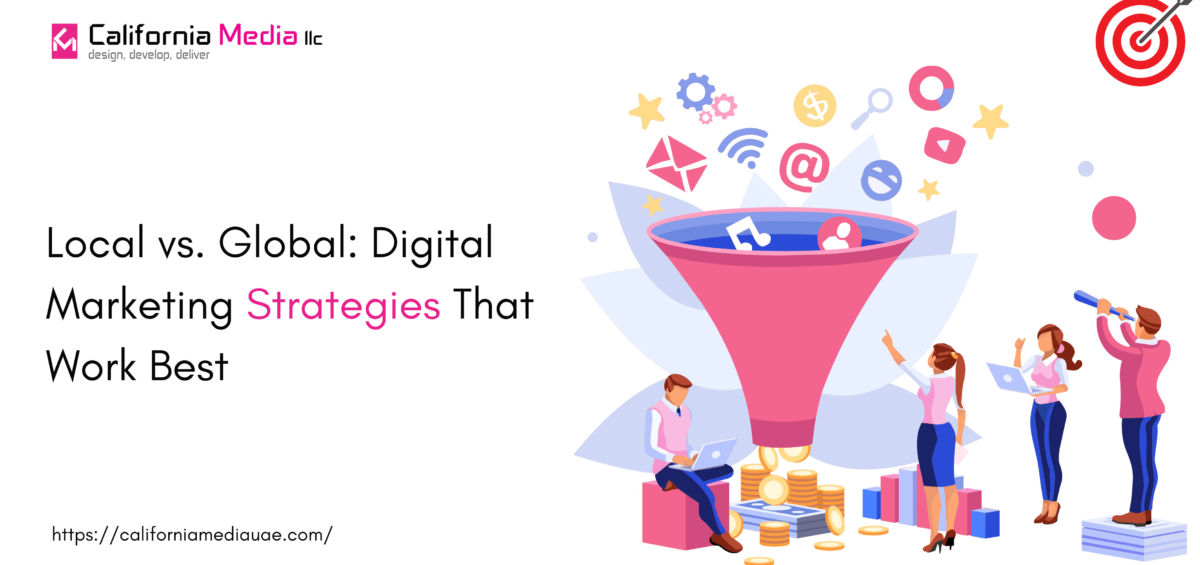In today’s highly competitive marketplace, businesses are no longer limited by geography. A company in Dubai can target local audiences with precision while also reaching customers on the other side of the world with the click of a button. However, success in digital marketing depends on one crucial decision—should you focus on local strategies, global strategies, or a balance of both?
This article explores the key differences, advantages, and approaches to local versus global digital marketing, helping you identify which strategy aligns best with your brand goals.
Understanding Local Digital Marketing
Local digital marketing focuses on reaching customers within a specific geographic area. Whether you’re a small business, a retail store, or a service provider, local campaigns allow you to connect with people who are nearby and more likely to convert.
Key Features of Local Marketing Strategies:
- Hyper-targeted Ads: Local ads can be tailored to specific cities, neighborhoods, or even zip codes.
- Google Business Profile: Optimizing your listing helps improve visibility for “near me” searches.
- Local SEO: Using region-specific keywords increases chances of ranking in search results when people look for products or services in their area.
- Community Engagement: Partnerships with local influencers, sponsorships, and events create brand trust.
When to Use Local Marketing:
- Businesses that rely heavily on physical locations.
- Service providers such as plumbers, gyms, restaurants, or salons.
- Companies wanting to build strong local brand recognition before expanding globally.
Understanding Global Digital Marketing
Global digital marketing, on the other hand, is designed to target customers across multiple countries. It requires a broad strategy that transcends cultural, language, and market differences.
Key Features of Global Marketing Strategies:
- Multilingual SEO and Content: Translating content and optimizing for different languages improves relevance.
- Global Social Media Presence: Brands create content that resonates across cultures while maintaining brand consistency.
- Paid Ads with International Reach: Platforms like Google Ads and Meta Ads allow global targeting with advanced segmentation.
- Cross-Cultural Branding: Understanding cultural nuances ensures your brand is well received across borders.
When to Use Global Marketing:
- E-commerce businesses that ship worldwide.
- Tech companies offering SaaS or digital products.
- Established brands looking to scale internationally.
Local vs. Global: Which Strategy Works Best?
The right approach depends on your business model, target audience, and growth goals. Here’s a breakdown of how each works in real-world scenarios.
1. Audience Targeting
- Local: Ideal for businesses with a geographically defined audience. For example, a fitness studio in Downtown Dubai benefits from attracting people nearby rather than reaching users abroad.
- Global: Best for businesses selling digital products, fashion, or electronics with international demand.
2. Budget Considerations
- Local: Generally cost-effective since ads and campaigns target a smaller audience.
- Global: Requires a larger budget due to translation, regional adaptation, and broader ad reach.
3. Competition Levels
- Local: Competition is smaller but often more intense within a niche market.
- Global: More competitors, but also more opportunities if differentiation is strong.
4. Branding
- Local: Allows for a personal touch, highlighting community involvement and regional identity.
- Global: Builds a universal brand identity, often with a focus on innovation and inclusivity.
Hybrid Approach: The Best of Both Worlds
For many businesses, the most effective digital marketing strategy is a hybrid model—blending both local and global efforts.
For example, a Dubai-based fashion retailer may:
- Use local marketing to attract UAE customers through Google Maps, local SEO, and targeted ads.
- Use global marketing by running campaigns on Instagram and TikTok, reaching audiences in Europe, the US, and Asia.
This combination ensures you dominate your home market while steadily building international presence.
Proven Local Digital Marketing Tactics
- Optimize Google Business Profile – Keep your business hours, location, and reviews up to date.
- Local SEO – Use keywords like “best restaurant in Dubai Marina” or “affordable cleaning services in JLT.”
- Customer Reviews – Encourage satisfied customers to leave positive ratings, which boost visibility.
- Local Influencer Collaborations – Partner with micro-influencers who resonate with your city’s lifestyle.
- Mobile-First Campaigns – Ensure all local ads are optimized for smartphones since most searches happen on mobile.
Proven Global Digital Marketing Tactics
- Content Localization – Adapt not just language but also visuals, colors, and cultural references.
- International SEO – Use hreflang tags, country-specific domains, and multilingual blogs.
- Global Social Media Strategy – Schedule posts according to time zones and trending topics in each region.
- Paid Campaigns by Region – Allocate budget for high-performing markets rather than spreading too thin.
- Analytics and Insights – Track performance in each country separately to refine strategies.
Common Mistakes to Avoid
- For Local Marketing:
- Ignoring Google reviews.
- Using generic keywords without city/location targeting.
- Overlooking mobile optimization.
- For Global Marketing:
- Failing to respect cultural differences.
- Using a one-size-fits-all campaign.
- Not having customer support across time zones.
Why Strategy Choice Matters
The digital marketplace is vast, and choosing between local and global strategies determines how effectively your brand stands out. Companies that ignore local opportunities miss out on loyal, high-value customers nearby. On the other hand, brands that fail to think globally may limit their growth potential.
For businesses looking to expand in the Middle East, combining Digital Marketing in Dubai with global outreach offers an edge, ensuring visibility in both regional and international markets. Similarly, leveraging expert SEO Services in Dubai can help rank higher locally while preparing your website for global traffic.
Final Thoughts
There is no one-size-fits-all answer to the “local vs. global” debate. Start by identifying your audience, budget, and growth goals. If your business thrives on local footfall, focus on local SEO and ads. If you aim for international expansion, invest in multilingual content and global campaigns.
The smartest businesses know when to integrate both—owning their home market while gradually scaling worldwide.
FAQs
Q1: Should small businesses focus on local or global marketing?
Small businesses usually benefit from local marketing first. Once they dominate their local market, they can slowly expand to global campaigns.
Q2: What is the biggest challenge in global digital marketing?
The primary challenge is cultural differences—content that resonates in one country may not work in another. Proper localization is key.
Q3: How important is SEO in local marketing?
SEO is crucial. Local keywords help customers find your business instantly, especially in “near me” searches.
Q4: Can one campaign serve both local and global audiences?
Yes, but it requires strategic segmentation. Ads and content should be personalized for each audience group.
Q5: How do I decide my marketing strategy?
Analyze your customer base, budget, and goals. If most sales are from local customers, prioritize local. If you ship or serve worldwide, invest in global.





